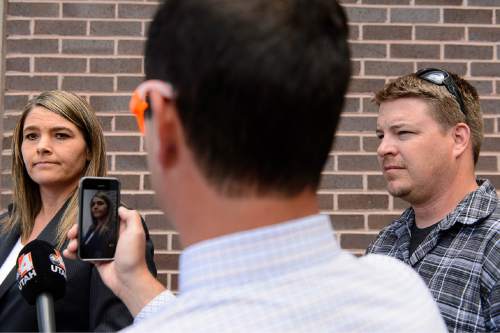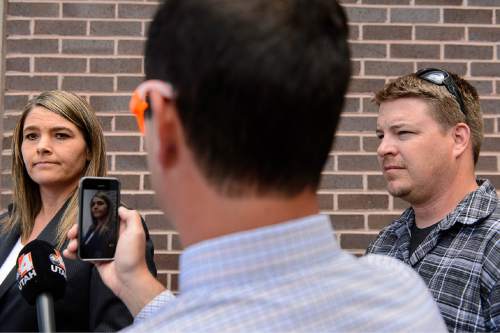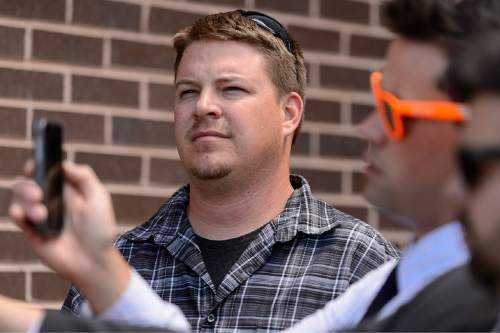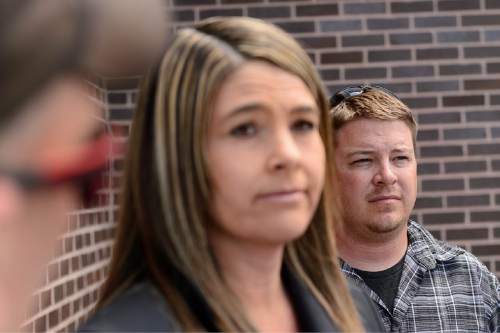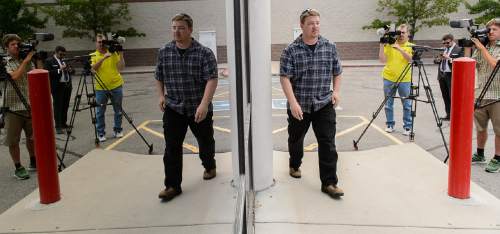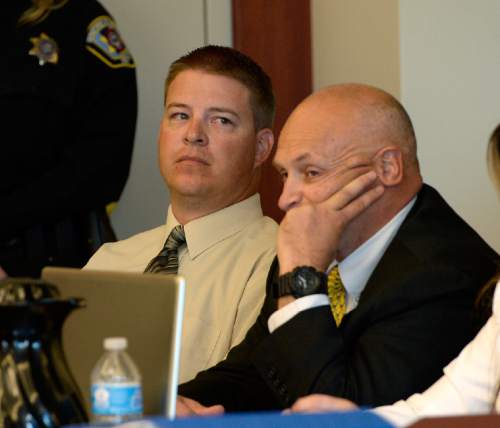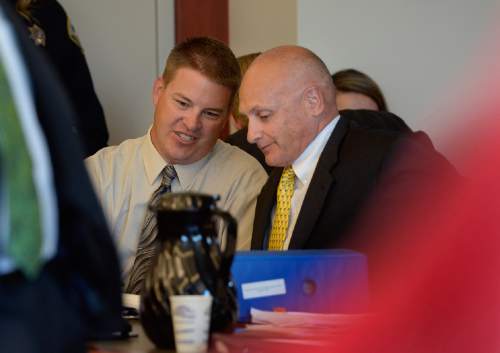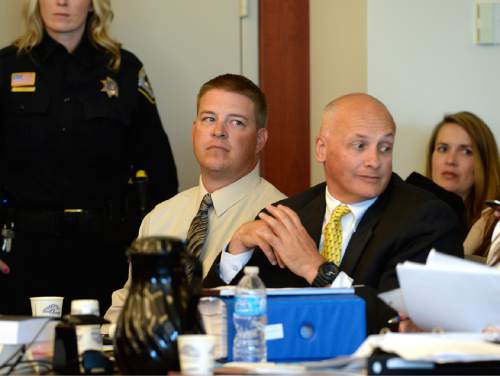This is an archived article that was published on sltrib.com in 2015, and information in the article may be outdated. It is provided only for personal research purposes and may not be reprinted.
West Valley City • The drug detective who killed Danielle Willard more than 2 1/2 years ago went back on West Valley City's payroll Wednesday, though it's not clear whether he will work as a police officer there.
Shaun Cowley — who was fired in September 2013 — had been fighting to get his job back. But the city on Wednesday filed paperwork to dismiss Cowley's administrative complaint over his termination.
His attorney, Lindsay Jarvis, said Cowley was reinstated as a West Valley City employee as of 2:30 p.m. Wednesday, when an administrative hearing officer signed the dismissal order.
Cowley will now start drawing a paycheck from the city, Jarvis said.
However, neither the city nor West Valley City's police department on Wednesday told Cowley when to report for duty. Jarvis said her client still does not have the badge the city confiscated when it terminated him.
Jarvis said, "He wants the opportunity to serve the public. The question is whether it will be here" in West Valley City.
Jarvis said the city dismissed the employment case because the hearing officer ordered the city to share the policy manual that articulated the evidence handling and report writing procedures which Cowley supposedly broke. She said the city was unable to produce that manual and didn't have the evidence to proceed with the case.
Jarvis, during a press conference, questioned whether such a manual exists.
Police Chief Lee Russo, who was hired in the aftermath of the Willard shooting, told The Tribune: "We're re-evaluting our position and what our next step will be."
West Valley City later issued a statement saying: "…some key pieces of evidence in the case have been excluded by the Hearing Officer. As a result of these developments, the city is no longer able to move forward with the case as it stands.
"The city still believes that it was reasonable and appropriate to terminate Mr. Cowley. We are now exploring our options as to what the next steps are in this process."
Jarvis spoke to reporters outside of West Valley City's justice court, where her client was to argue during a hearing scheduled for next week that he should be reinstated. Instead, a hearing there Monday will determine whether the city will pay Cowley only his back wages, which Jarvis said amounts to $104,000, or all the back pay plus the cost of benefits he would have acquired in that time. Jarvis said that figure is about $200,000.
Jarvis said Cowley realizes there are ways he could have improved his performance at his job, including writing better reports and better documenting of his narcotics cases. But, she said, the police department should have retrained Cowley; not fired him.
As for Willard, Jarvis said Cowley made no mistakes.
"Someone should listen to commands when driving away," Jarvis said, "and not be under the influence of narcotics."
Danielle Willard's mother, Melissa Kennedy — who said no one from West Valley City had notified her of the new developments with Cowley's case — told The Tribune she doesn't think Cowley should be a police officer again.
"The citizens of West Valley City deserve better than to have those types of people protect them," Kennedy said.
She also said that the issue of the police manual does not get to the heart of the matter as to whether Cowley behaved appropriately as a police officer.
"I just can't believe it," said Kennedy, who lives in Washington state. "It just blows my mind, the kinds of things that happen in Utah."
West Valley City has already paid $1.425 million to Willard's family to settle their wrongful death lawsuit.
On Nov. 2, 2012, Cowley and his partner, Kevin Salmon, said they approached the 21-year-old Willard, who was sitting in her Subaru Forester outside an apartment complex, because they believe they had seen her buying drugs.
Cowley said that when Willard backed out of the parking space, he thought she was trying to run him over. He fired the shot that struck Willard in the head; Salmon fired and missed.
Both detectives were placed on leave immediately after the shooting. Then Cowley was fired, though not for the shooting.
West Valley City said it found drug evidence in the trunk of Cowley's car that should have been submitted to the police department, and that he mishandled evidence in other drug cases.
The Salt Lake County District Attorney charged Cowley with manslaughter for Willard's death, but a state court judge dismissed that charge during an October preliminary hearing, saying there was insufficient evidence to advance the case to trial.
Salmon remained on paid leave for almost two years before resigning.
Jarvis on Wednesday repeated what she has claimed since Cowley was first accused of misconduct. She said Cowley was a "scapegoat" for a police department and Neighborhood Narcotics Unit rife with problems.
Investigations after the Willard shooting found the Neighborhood Narcotics Unit failed to document use of force, kept certain items as trophies, and the sergeant and lieutenant in the unit failed to supervise.
"Chief Russo is a figure that keeps these problems going," Jarvis said.
John Coyle, the lieutenant over the Neighborhood Narcotics Unit, was demoted to a rank-and-file officer. But he appealed and a city panel overturned the demotion. The city is challenging that decision at the Utah Court of Appeals.
How West Valley City has treated Coyle since his rank was restored might offer a clue of how it will handle Cowley. Coyle has not been allowed on the street or to supervise officers who are on the street. Instead, his lawyer said in April, Coyle has been working in the police department's records unit.
Jarvis acknowledged Wednesday that the public may not be at ease with Cowley policing again, but she blamed West Valley City for causing that discomfort.
Cowley, 34, dressed in a plaid shirt and black pants, was present beside Jarvis at the news conference, but did not speak. In March, he told USA Today that he had to take work laying hardwood floors and repairing medical equipment. Both jobs were with family.
He also told the newspaper that he and his wife could no longer afford rent and then separated.
Twitter: @natecarlisle


